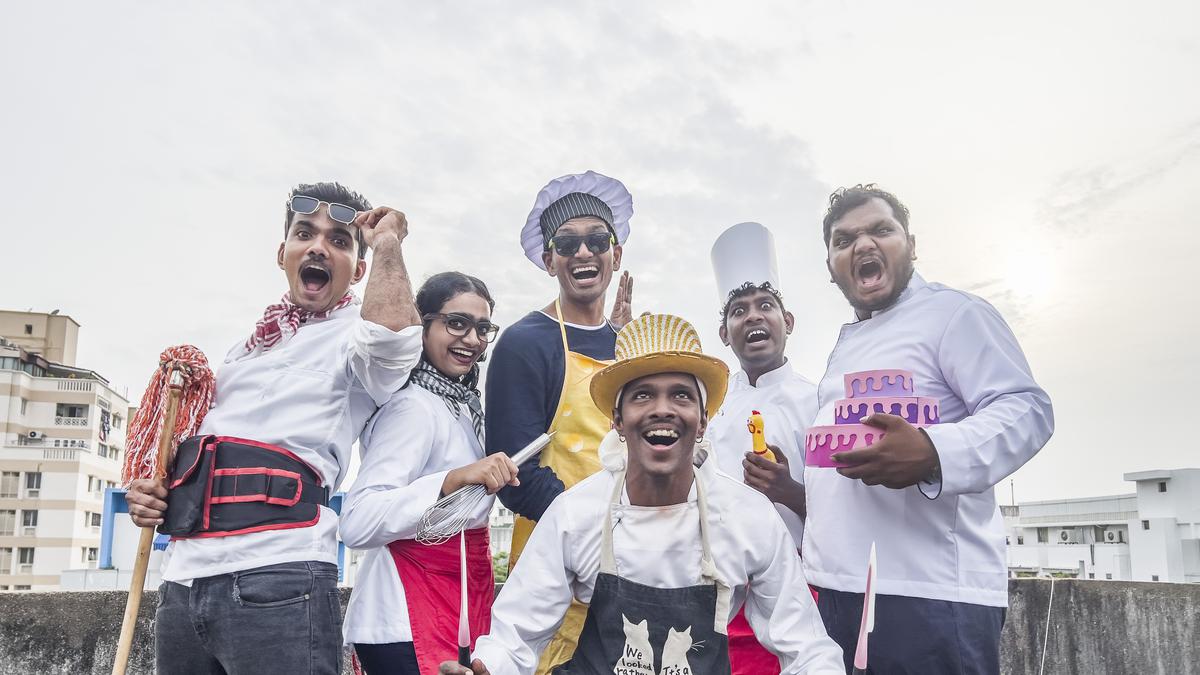
Plays from South Korea and Chennai feature in this international children’s theatre fest
The Hindu
The 12th edition of The Little Festival will feature clowning, and Korean puppetry as two productions and a panel discussion comes to stage
The clang of metal pots, ding of spatulas, and thrum of water canisters seamlessly give way to a foot-tapping rhythmic interlude that gains pace second by second. We are in the kitchen of chefs Sweet Pea, Souffle, Magic Macaroni, Jojo and Capsicum, a cast just as whacky as their names. They clown their way through a busy, chaotic and noisy kitchen, in pursuit of some learnings . The Little Theatre’s rehearsal space, Cheriana , is once again alive with song, dance and dialogue as the cast of The Kooks: Sunny Side-Up prepare to get on stage this weekend with a physical comedy that ponders on resolving conflict and working in harmony: all from inside a kitchen, in the company of good food.
The play will premiere at the 12th edition of The Little Festival, a festival for young audiences, that brings world theatre to Chennai. This time, His Day, a non-verbal children’s production replete with music, mime and puppetry from South Korea also makes its first appearance in the city.
“The entire show is based on clowning. It is also a tribute to the kind of work that clowns are doing across spaces, on stages across countries, hospitals and just everyday life, and how they alleviate suffering,” says Krishnakumar Balasubramanian (KK), artistic director of The Little Theatre, who will also star in the production as Idli. He refers to the setting as a “kitchen of infinite possibilities.” KK continues, “The show is going to be highly interactive and is also minimal in terms of words. I wanted it to reach people of all languages. There are only two languages here — one is that of clowning, and the other, humour.”
The idea of food often also translates to a sense of community, adds KK, describing the setting. “It is laced almost entirely with slapstick comedy. Young audiences have great emotional bandwidth and often notice how the body works, so movement is essential,” says KK.
While the home production takes the help of physical comedy and clowning, His Day from South Korea dabbles in puppetry and mime, and is also entirely non-verbal. “[The show] tells the story of any normal person living in the present, including myself,” says director Hyunsan Jo from ArtstageSAN. The narrative follows a typical day in the life of a salaryman that turns into a fantasy puppet performance. Since His Day is partially a puppet performance, the visual image is important. “The main character is played by an actor, who also appears as a small table puppet in some scenes. We use puppets to portray the mind of the main character with diverse images,” he adds. The story is led by the actors’ movements, mime, music and other elements that help viewers to understand the play sans dialogue.
While the shows are tailored for young audiences, they are also layered and cater to the child in every adult, KK says. An open mind and vibrant imagination are the prerequisites. “We hope [to provide] a time of empathy and comfort, even if it’s for a short period,” he adds. The festival will also host a panel discussion on The Impact of Arts on Mental Health with experts like Anita Ratnam, Dr Lakshmi Sankaran and Preeti Vasudevan, from the field of medicine and arts.
The Kooks: Sunny Side-Up will play on July 2 (4 pm), 3 (11am and 6pm) and 4 (11 am), and His Day will play on July 5 and 6, at 11 am. The panel discussion will be on July 5, 6 to 8 pm at Goethe-Institut/ Max Mueller Bhavan. His Day will also play in Rangashankara, Bengaluru on July 9 and Glendale International School, Hyderabad on July 14.

Several principals of government and private schools in Delhi on Tuesday said the Directorate of Education (DoE) circular from a day earlier, directing schools to conduct classes in ‘hybrid’ mode, had caused confusion regarding day-to-day operations as they did not know how many students would return to school from Wednesday and how would teachers instruct in two modes — online and in person — at once. The DoE circular on Monday had also stated that the option to “exercise online mode of education, wherever available, shall vest with the students and their guardians”. Several schoolteachers also expressed confusion regarding the DoE order. A government schoolteacher said he was unsure of how to cope with the resumption of physical classes, given that the order directing government offices to ensure that 50% of the employees work from home is still in place. On Monday, the Commission for Air Quality Management in the National Capital Region and Adjoining Areas (CAQM) had, on the orders of the Supreme Court, directed schools in Delhi-NCR to shift classes to the hybrid mode, following which the DoE had issued the circular. The court had urged the Centre’s pollution watchdog to consider restarting physical classes due to many students missing out on the mid-day meals and lacking the necessary means to attend classes online. The CAQM had, on November 20, asked schools in Delhi-NCR to shift to the online mode of teaching.










